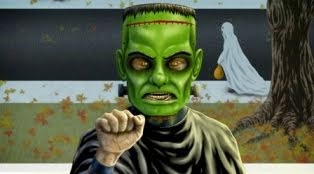By 1997, Sylvester Stallone had a few high-profile flops to his name. His days of ruling the box office were behind him. And he knew it. Around the same time, flashy but gritty crime dramas began to become something of a cultural phenomenon, especially among indie movies. Blame that one on Quentin Tarantino. Stallone’s desire to re-invent himself and the public’s sudden desire for crime stories collided with “Cop Land.” Sly was so serious about proving his acting chops, that the action icon did what many actors do when they want to show off their abilities: He put on weight, about forty pounds. Though “Cop Land” received a nice critical reception, with Stallone’s performance being especially praised, it didn’t win him any major awards and didn’t lead to a career revival.
Just outside New York City resides the small New Jersey town of Garrison. Founded and mostly occupied by NYC cops, the town and its residents frequently feature in cover-ups of police corruption. One such event happens when officer Murray Babitch, a beloved member of the local community, kills two unarmed black youths. The local cops at first seem more then willing to cover up the crime until the situation gets too hot. Even Murray’s uncle, Ray, wants him dead. Out of this ugly situation, an unlikely hero emerges. Freddy Heflin, the pudgy and partially deaf Sheriff of Garrison, slowly finds himself standing up to the town’s powerful occupants.
For all the recognizable names in its cast, Sylvester Stallone emerges as the definite protagonist. It’s not immediately clear. Freddy Heflin is introduced playing a pinball machine, not even being the most important person in the bar. He drives while intoxicated, slipping off the road, and breaking his nose. The character sports either a bandage or a long scab for the rest of the film. The next morning, we see Freddy awaken in bed, his gut hanging out of his tank-top. This is not the Sylvester Stallone of “Cobra” or “Demolition Man.” Freddy is a loser. He peaked as a teenager, after rescuing a girl from a car wreck. The event cost him his hearing and, thirty years later, he still harbors romantic feelings for the married woman. At the beginning, Freddy is happy to kowtow to the demands of the dirty cops. If you believe that Sly’s films reflect his career, this is the actor realizing he had his chance and missed it. It’s surprising to see the actor, the same muscled god that murdered all of Vietnam, in such a humanizing role. Stallone bares his soul here and plums the depths of his acting ability. He proves that he still has the chops.
Freddy goes for a surprising transformation throughout the film. As he realizes the depths of the local police corruption, he begins to have doubts. Soon, the palooka sheriff emerges as the most principled man in the entire town. In a weird way, “Cop Land” turns many of Sly’s role as a renegade cop on its head. Heflin is soft-spoken but soon finds himself standing up against the rest of the department. In the incredible last act of “Cop Land,” the character silently marches through the town, shotgun in hand, his good ear ringing from a gunshot. Bullet flies and blood splatters. Freddy is not a glorified killer. He’s a normal guy, forced into a hard corner, doing what he must to survive and uphold the law. During those final minutes, “Cop Land” truly comes together, becoming an excellent thriller with a surprisingly deep layer of pathos.
As an ensemble picture, “Cop Land” has a lot of story lines and subplots to juggle. A subplot about Keitel’s wife cheating on him with another police officer, who later gets tossed off a cliff by a crazed criminal, doesn’t amount too much. Similarly, a storyline about Liotta and his prostitute girlfriend never comes into focus much. “Cop Land’s” dark tone, paired with its deliberate pacing, is almost strangling at times. The film is a worthy watch but not always the most inviting.
Perhaps “Cop Land’s” good-not-great reception can be blamed on its distributor. Miramax was behind the film and seemed to position it as their next “Pulp Fiction.” That was a goal the moody, dark film couldn’t live up to. The theatrical release ran 104 minutes while James Mangold’s director’s cut runs nearly two hours. This seems to suggest that Harvey Weinstein got his Scissorhands on the movie, perhaps affecting its critical greeting. Stallone would soon drop the weight and return to the mediocre movies that sunk his box office clout in the first place. Though not discussed much, “Cop Land” remains a respected entry among Stallone enthusiasts, one of his best performances, and a well executed film in its own right. [8/10]
[THE STALLOWNAGE OF SLY: 3 outta 5]
[X] Frank Stallone or Frank Stallone-esque Inspirational Music
[] Incapacitates or Kills Someone With His Body
[] Shows Off Buffness
[X] Social Outcast [Loser Sheriff]
[X] Sweaty, Veiny Yelling






No comments:
Post a Comment